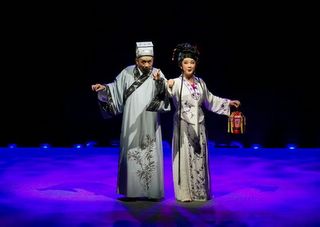 I was very excited when I got home today and saw a parcel left on my table. Just days ago I've placed an internet order for this Liyuan Opera DVD called "Dong Sheng Yu Li Shi" (translated as "Mr. Dong and Miss Lee" on the cover) and to my suprise it arrived very fast.
I was very excited when I got home today and saw a parcel left on my table. Just days ago I've placed an internet order for this Liyuan Opera DVD called "Dong Sheng Yu Li Shi" (translated as "Mr. Dong and Miss Lee" on the cover) and to my suprise it arrived very fast.Liyuan opera of Fujian province is one of China's oldest form of Chinese opera, alongside with Puxian opera (also from Fujian province) and Kun opera (more popular in the north). Liyuan opera is well-known for having a set of unique body movements and hand gestures, as well as relatively well-preserved scripts dated from as far as Song dynasty. Quanzhou City Liyuan Opera Troupe, the troupe which performed this show in the DVD, is the only professional troupe performing this genre of opera left in China. This show is actually one of their old shows, but had given it a facelift last year and had been given rather good critics for it. Although I have seen Liyuan Opera shows before and liked them alot, this DVD is nothing like the previous shows I've watched. First, the scenograpghy is simply breathtaking. Designed and conceptualised by Xiamen's up and coming Huang Yongying, the stage looked simple and elegant. The lighting was vibrant and nicely done, giving the stage a very poetic and ancient feel. Not forgetting the new costumes and hair accessories made for this show, which gives the show a modern touch. Visual sensations aside, the story is equally captivating. This show is about a young and beautiful Miss Lee who became a widow after her old and fraile husband, Squire Peng, passed away. Before his death, Squire Peng asked his neighbour, middle-aged schoolteacher Mr. Dong, to spy on his wife for any signs of adultery and report to him at his grave once a month. As time went by, Mr. Dong and Miss Lee somehow got attracted to each other, and after much hesitation, they finally decided to be together, and admit their love for each other at Squire Peng's grave. The entire show is filled with wittiness, making it more fun to watch. From Mr. Dong being scolded as being a "ass following dog" to Miss Lee pretending to be engaged in sweet-talks with an imaginery "suitor" when she found out that Mr. Dong was eavesdoping by the wall, and to the climax of the show whereby Mr. Dong finally gathered all his might to scold back at Squire Peng's ghost at his grave, making Squire Peng's ghost retreat back to his grave crying and resign to fate that his wife was going to remarry. Although I had been a fan of Liyuan Opera, I never imagine that it could be so interesting and full of humour!
It is an eye-opener watching this show, and I am glad that I managed to own this DVD. I hope Quanzhou City Liyuan Opera Troupe can release more of their shows on DVD in future, so as to let more people have the chance to appreciate the finest in Chinese opera.
